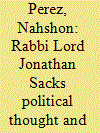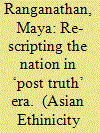| Srl | Item |
| 1 |
ID:
106323


|
|
|
|
|
| Publication |
2011.
|
| Summary/Abstract |
North Korea has a powerful national narrative which is based on struggle against external forces. Since the mid-nineties, this has been centered on sacrifice for the sake of military strength. Recently, however, this narrative arc has been shifted: Now the people are to be rewarded by the central government for years of sacrifice with improvement to quality of life. The 2009 currency reform, rather than simply a failure, was an integral part of the strategy to deliver this improvement by 2012. China's continued support for Pyongyang's plans to develop infrastructure and expand trade, combined with the national narrative, gives this development plan a reasonable chance to succeed.
|
|
|
|
|
|
|
|
|
|
|
|
|
|
|
|
| 2 |
ID:
191000


|
|
|
|
|
| Summary/Abstract |
An internationally renowned scholar and theologian, Rabbi Lord Jonathan Sacks (1948–2020), longstanding Chief Rabbi of the United Hebrew Congregations of the Commonwealth (1991–2013), suggested a direct discussion of the State of Israel. By way of exploring the way he viewed the modern State of Israel, this article discusses Rabbi Sacks’ overall communitarian, covenant based ideas before focusing on three categories: national narrative, the invigoration of civil society, and the place of religion. His most distinct criticism relates to the interrelationship between religion, the political system, and the state, illustrated inter alia by his insistence that ‘Judaism must be depoliticised and put back where it belongs, in civil society, far removed from all structures of power’.
|
|
|
|
|
|
|
|
|
|
|
|
|
|
|
|
| 3 |
ID:
161471


|
|
|
|
|
| Summary/Abstract |
The Kurdish Muslim has been formed through a binary code combining attachment to the Islamic international Ummah with Kurdish local tribal (eshiri) values while Kurdish Islamic agents have been reinvigorated by an Islamic identity articulated within a Kurdish national mobilization. This inner counter-hegemonic articulation within a new antagonism has redrawn Kurdish political frontiers and Kurdish common sense. This article analyses the structure of Kurdish Islamic identity and discourse through its diverse agents in Turkey and in the Middle East in general. In probing the complex conceptual relationship between religious identity and national will, the article identifies four main actors within Kurdish Muslim politics by mapping their sub-identities and strategies to allow a detailed and critical appraisal. Moreover, it critically examines how the Muslim Kurds have (re)appeared in the Kurdish political realm as an institutional expression and re-conceptualization of collective Kurdishness in terms of Islamic values. A social constructivist approach is employed as a useful theoretical device to understand the role of Muslim Kurds and their sub-identity in Kurdish society and their relationship with the hegemonic Kurdish political movement.
|
|
|
|
|
|
|
|
|
|
|
|
|
|
|
|
| 4 |
ID:
185946


|
|
|
|
|
| Summary/Abstract |
This paper evaluates the ways in which new national narratives are sought to be constructed in ‘post-truth’ era – marked by what Harsin terms competing convictions, discord and confusion and attempts to manage the communication environment. New technologies and online spaces facilitate the ‘re-creation’ and ‘re-construction’ of the past and are co-opted in the nation building project. In the context of extensive studies on how the democratic potential of new technologies is subverted, this paper calls for specific attention to the ways in which (imprecise) history forms part of discursive nationalism in present times. Taking up India as a case study, the paper explores and evaluates the strategies employed in the rescripting of the national narrative potentially leading to new national memory.
|
|
|
|
|
|
|
|
|
|
|
|
|
|
|
|